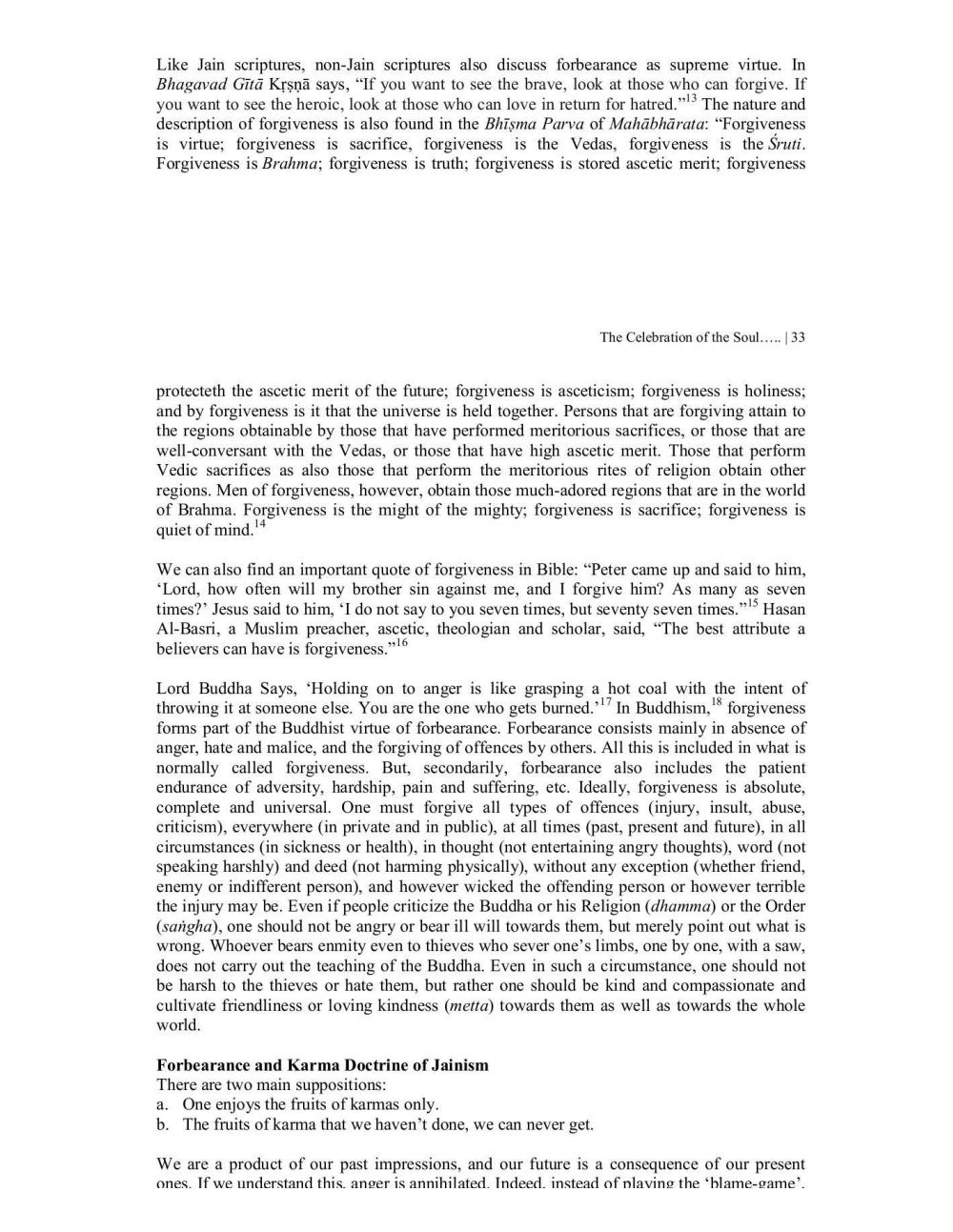________________
Like Jain scriptures, non-Jain scriptures also discuss forbearance as supreme virtue. In Bhagavad Gita Kṛṣṇā says, "If you want to see the brave, look at those who can forgive. If you want to see the heroic, look at those who can love in return for hatred."13 The nature and description of forgiveness is also found in the Bhisma Parva of Mahābhārata: "Forgiveness is virtue; forgiveness is sacrifice, forgiveness is the Vedas, forgiveness is the Śruti. Forgiveness is Brahma; forgiveness is truth; forgiveness is stored ascetic merit; forgiveness
The Celebration of the Soul..... | 33
protecteth the ascetic merit of the future; forgiveness is asceticism; forgiveness is holiness; and by forgiveness is it that the universe is held together. Persons that are forgiving attain to the regions obtainable by those that have performed meritorious sacrifices, or those that are well-conversant with the Vedas, or those that have high ascetic merit. Those that perform Vedic sacrifices as also those that perform the meritorious rites of religion obtain other regions. Men of forgiveness, however, obtain those much-adored regions that are in the world of Brahma. Forgiveness is the might of the mighty; forgiveness is sacrifice; forgiveness is quiet of mind."
We can also find an important quote of forgiveness in Bible: "Peter came up and said to him, 'Lord, how often will my brother sin against me, and I forgive him? As many as seven times?' Jesus said to him, 'I do not say to you seven times, but seventy seven times."15 Hasan Al-Basri, a Muslim preacher, ascetic, theologian and scholar, said, "The best attribute a believers can have is forgiveness."16
Lord Buddha Says, 'Holding on to anger is like grasping a hot coal with the intent of throwing it at someone else. You are the one who gets burned.'17 In Buddhism,18 forgiveness forms part of the Buddhist virtue of forbearance. Forbearance consists mainly in absence of anger, hate and malice, and the forgiving of offences by others. All this is included in what is normally called forgiveness. But, secondarily, forbearance also includes the patient endurance of adversity, hardship, pain and suffering, etc. Ideally, forgiveness is absolute, complete and universal. One must forgive all types of offences (injury, insult, abuse, criticism), everywhere (in private and in public), at all times (past, present and future), in all circumstances (in sickness or health), in thought (not entertaining angry thoughts), word (not speaking harshly) and deed (not harming physically), without any exception (whether friend, enemy or indifferent person), and however wicked the offending person or however terrible the injury may be. Even if people criticize the Buddha or his Religion (dhamma) or the Order (sangha), one should not be angry or bear ill will towards them, but merely point out what is wrong. Whoever bears enmity even to thieves who sever one's limbs, one by one, with a saw, does not carry out the teaching of the Buddha. Even in such a circumstance, one should not be harsh to the thieves or hate them, but rather one should be kind and compassionate and cultivate friendliness or loving kindness (metta) towards them as well as towards the whole world.
Forbearance and Karma Doctrine of Jainism
There are two main suppositions:
a. One enjoys the fruits of karmas only.
b. The fruits of karma that we haven't done, we can never get.
We are a product of our past impressions, and our future is a consequence of our present ones. If we understand this. anger is annihilated. Indeed, instead of plaving the 'blame-game".




